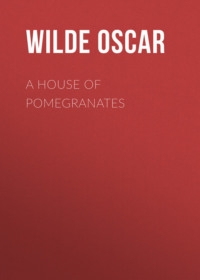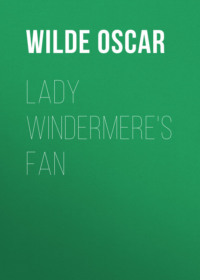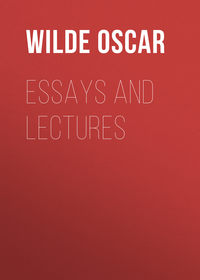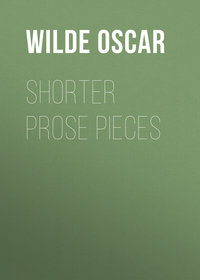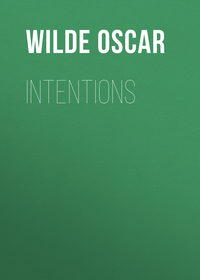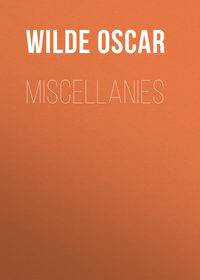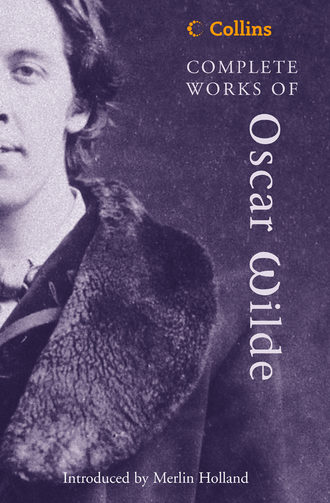
Полная версия
Complete Works of Oscar Wilde
Suddenly the man drew up with a jerk at the top of a dark lane. Over the low roofs and jagged chimney stacks of the houses rose the black masts of ships. Wreaths of white mist clung like ghostly sails to the yards.
‘Somewhere about here, sir, ain’t it?’ he asked huskily through the trap.
Dorian started, and peered round. ‘This will do,’ he answered, and, having got out hastily, and given the driver the extra fare he had promised him, he walked quickly in the direction of the quay. Here and there a lantern gleamed at the stern of some huge merchantman. The light shook and splintered in the puddles. A red glare came from an outward-bound steamer that was coaling. The slimy pavement looked like a wet mackintosh.
He hurried on towards the left, glancing back now and then to see if he was being followed. In about seven or eight minutes he reached a small shabby house, that was wedged in between two gaunt factories. In one of the top windows stood a lamp. He stopped, and gave a peculiar knock.
After a little time he heard steps in the passage, and the chain being unhooked. The door opened quietly, and he went in without saying a word to the squat misshapen figure that flattened itself into the shadow as he passed. At the end of the hall hung a tattered green curtain that swayed and shook in the gusty wind which had followed him in from the street. He dragged it aside, and entered a long, low room which looked as if it had once been a third-rate dancing-saloon. Shrill flaring gas jets, dulled and distorted in the fly-blown mirrors that faced them, were ranged round the walls. Greasy reflectors of ribbed tin backed them, making quivering discs of light. The floor was covered with ochre-coloured sawdust, trampled here and there into mud, and stained with dark rings of spilt liquor. Some Malays were crouching by a little charcoal stove playing with bone counters and showing their white teeth as they chattered. In one corner, with his head buried in his arms, a sailor sprawled over a table, and by the tawdrily-painted bar that ran across one complete side stood two haggard women mocking an old man who was brushing the sleeves of his coat with an expression of disgust. ‘He thinks he’s got red ants on him,’ laughed one of them, as Dorian passed by. The man looked at her in terror and began to whimper.
At the end of the room there was a little staircase, leading to a darkened chamber. As Dorian hurried up its three rickety steps, the heavy odour of opium met him. He heaved a deep breath, and his nostrils quivered with pleasure. When he entered, a young man with smooth yellow hair, who was bending over a lamp, lighting a long thin pipe, looked up at him, and nodded in a hesitating manner.
‘You here, Adrian?’ muttered Dorian.
‘Where else should I be?’ he answered, listlessly. ‘None of the chaps will speak to me now.’
‘I thought you had left England.’
‘Darlington is not going to do anything. My brother paid the bill at last. George doesn’t speak to me either…I don’t care,’ he added, with a sigh. ‘As long as one has this stuff, one doesn’t want friends. I think I have had too many friends.’
Dorian winced, and looked round at the grotesque things that lay in such fantastic postures on the ragged mattresses. The twisted limbs’, the gaping mouths, the staring lustreless eyes, fascinated him. He knew in what strange heavens they were suffering, and what dull hells were teaching them the secret of some new joy. They were better off than he was. He was prisoned in thought. Memory, like a horrible malady, was eating his soul away. From time to time he seemed to see the eyes of Basil Hallward looking at him. Yet he felt he could not stay. The presence of Adrian Singleton troubled him. He wanted to be where no man would know who he was. He wanted to escape from himself.
‘I am going on to the other place,’ he said, after a pause.
‘On the wharf?’
‘Yes.’
‘That mad-cat is sure to be there. They won’t have her in this place now.’
Dorian shrugged his shoulders. ‘I am sick of women who love one. Women who hate one are much more interesting. Besides, the stuff is better.’
‘Much the same.’
‘I like it better. Come and have something to drink. I must have something.’
‘I don’t want anything,’ murmured the young man.
‘Never mind.’
Adrian Singleton rose up wearily, and followed Dorian to the bar. A halfcaste, in a ragged turban and a shabby ulster, grinned a hideous greeting as he thrust a bottle of brandy and two tumblers in front of them. The women sidled up, and began to chatter. Dorian turned his back on them, and said something in a low voice to Adrian Singleton.
A crooked smile, like a Malay crease, writhed across the face of one of the women.
‘We are very proud to-night,’ she sneered.
‘For God’s sake don’t talk to me,’ cried Dorian, stamping his foot on the ground. ‘What do you want? Money? Here it is. Don’t ever talk to me again.’
Two red sparks flashed for a moment in the woman’s sodden eyes, then flickered out, and left them dull and glazed. She tossed her head, and raked the coins off the counter with greedy fingers. Her companion watched her enviously.
‘It’s no use,’ sighed Adrian Singleton. ‘I don’t care to go back. What does it matter? I am quite happy here.’
‘You will write to me if you want anything, won’t you?’ said Dorian, after a pause.
‘Perhaps.’
‘Good-night, then.’
‘Good-night,’ answered the young man, passing up the steps, and wiping his parched mouth with a handkerchief.
Dorian walked to the door with a look of pain in his face. As he drew the curtain aside a hideous laugh broke from the painted lips of the woman who had taken his money. ‘There goes the devil’s bargain!’ she hiccoughed, in a hoarse voice.
‘Curse you!’ he answered, ‘don’t call me that.’
She snapped her fingers. ‘Prince Charming is what you like to be called, ain’t it?’ she yelled after him.
The drowsy sailor leapt to his feet as she spoke, and looked wildly round. The sound of the shutting of the hall door fell on his ear. He rushed out as if in pursuit.
Dorian Gray hurried along the quay through the drizzling rain. His meeting with Adrian Singleton had strangely moved him, and he wondered if the ruin of that young life was really to be laid at his door, as Basil Hallward had said to him with such infamy of insult. He bit his lip, and for a few seconds his eyes grew sad. Yet, after all, what did it matter to him? One’s days were too brief to take the burden of another’s errors on one’s shoulders. Each man lived his own life, and paid his own price for living it. The only pity was one had to pay so often for a single fault. One had to pay over and over again, indeed. In her dealings with man Destiny never closed her accounts.
There are moments, psychologists tell us, when the passion for sin, or for what the world calls sin, so dominates a nature, that every fibre of the body, as every cell of the brain, seems to be instinct with fearful impulses. Men and women at such moments lose the freedom of their will. They move to their terrible end as automatons move. Choice is taken from them, and conscience is either killed, or, if it lives at all, lives but to give rebellion its fascination, and disobedience its charm. For all sins, as theologians weary not of reminding us, are sins of disobedience. When that high spirit, that morning-star of evil, fell from heaven, it was as a rebel that he fell.
Callous, concentrated on evil, with stained mien, and soul hungry for rebellion, Dorian Gray hastened on, quickening his step as he went, but as he darted aside into a dim archway, that had served him often as a short cut to the ill-famed place where he was going, he felt himself suddenly seized from behind, and before he had time to defend himself he was thrust back against the wall, with a brutal hand round his throat.
He struggled madly for life, and by a terrible effort wrenched the tightening fingers away. In a second he heard the click of a revolver, and saw the gleam of a polished barrel pointing straight at his head, and the dusky form of a short thick-set man facing him.
‘What do you want?’ he gasped.
‘Keep quiet,’ said the man. ‘If you stir, I shoot you.’
‘You are mad. What have I done to you?’
‘You wrecked the life of Sibyl Vane,’ was the answer, ‘and Sibyl Vane was my sister. She killed herself. I know it. Her death is at your door. I swore I would kill you in return. For years I have sought you. I had no clue, no trace. The two people who could have described you were dead. I knew nothing of you but the pet name she used to call you. I heard it to-night by chance. Make your peace with God, for to-night you are going to die.’
Dorian Gray grew sick with fear. ‘I never knew her,’ he stammered. ‘I never heard of her. You are mad.’
‘You had better confess your sin, for as sure as I am James Vane, you are going to die.’ There was a horrible moment. Dorian did not know what to say or do. ‘Down on your knees!’ growled the man. ‘I give you one minute to make your peace – no more. I go on board to-night for India, and I must do my job first. One minute. That’s all.’
Dorian’s arms fell to his side. Paralysed with terror, he did not know what to do. Suddenly a wild hope flashed across his brain. ‘Stop,’ he cried. ‘How long ago is it since your sister died? Quick, tell me!’
‘Eighteen years,’ said the man. ‘Why do you ask me? What do years matter?’
‘Eighteen years,’ laughed Dorian Gray, with a touch of triumph in his Voice. ‘Eighteen years! Set me under the lamp and look at my face!’
James Vane hesitated for a moment, not understanding what was meant. Then he seized Dorian Gray and dragged him from the archway.
Dim and wavering as was the wind-blown light, yet it served to show him the hideous error, as it seemed, into which he had fallen, for the face of the man he had sought to kill had all the bloom of boyhood, all the unstained purity of youth. He seemed little older than a lad of twenty summers, hardly older, if older indeed at all, than his sister had been when they had parted so many years ago. It was obvious that this was not the man who had destroyed her life.
He loosened his hold and reeled back. ‘My God! my God!’ he cried, ‘and I would have murdered you!’
Dorian Gray drew a long breath. ‘You have been on the brink of committing a terrible crime, my man,’ he said, looking at him sternly. ‘Let this be a warning to you not to take vengeance into your own hands.’
‘Forgive me, sir,’ muttered James Vane. ‘I was deceived. A chance word I heard in that damned den set me on the wrong track.’
‘You had better go home, and put that pistol away, or you may get into trouble,’ said Dorian, turning on his heel, and going slowly down the street.
James Vane stood on the pavement in horror. He was trembling from head to foot. After a little while a black shadow that had been creeping along the dripping wall moved out into the light and came close to him with stealthy footsteps. He felt a hand laid on his arm and looked round with a start. It was one of the women who had been drinking at the bar.
‘Why didn’t you kill him?’ she hissed out, putting her haggard face quite close to his. ‘I knew you were following him when you rushed out from Daly’s. You fool! You should have killed him. He has lots of money, and he’s as bad as bad.’
‘He is not the man I am looking for,’ he answered, ‘and I want no man’s money. I want a man’s life. The man whose life I want must be nearly forty now. This one is little more than a boy. Thank God, I have not got his blood upon my hands.’
The woman gave a bitter laugh. ‘Little more than a boy!’ she sneered. ‘Why, man, it’s nigh on eighteen years since Prince Charming made me what I am.’
‘You lie!’ cried James Vane.
She raised her hand up to heaven. ‘Before God I am telling the truth,’ she cried.
‘Before God?’
‘Strike me dumb if it ain’t so. He is the worst one that comes here. They say he has sold himself to the devil for a pretty face. It’s nigh on eighteen years since I met him. He hasn’t changed much since then. I have though,’ she added, with a sickly leer.
‘You swear this?’
‘I swear it,’ came in hoarse echo from her flat mouth. ‘But don’t give me away to him,’ she whined; ‘I am afraid of him. Let me have some money for my night’s lodging.’
He broke from her with an oath, and rushed to the corner of the street, but Dorian Gray had disappeared. When he looked back, the woman had vanished also.
17
A WEEK later Dorian Gray was sitting in the conservatory at Selby Royal talking to the pretty Duchess of Monmouth, who with her husband, a jadedlooking man of sixty, was amongst his guests. It was tea-time, and the mellow light of the huge lace-covered lamp that stood on the table lit up the delicate china and hammered silver of the service at which the Duchess was presiding. Her white hands were moving daintily among the cups, and her full red lips were smiling at something that Dorian had whispered to her. Lord Henry was lying back in a silk-draped wicker chair looking at them. On a peach-coloured divan sat Lady Narborough pretending to listen to the Duke’s description of the last Brazilian beetle that he had added to his collection. Three young men in elaborate smoking-suits were handing tea-cakes to some of the women. The house-party consisted of twelve people, and there were more expected to arrive on the next day.
‘What are you two talking about?’ said Lord Henry, strolling over to the table, and putting his cup down. ‘I hope Dorian has told you about my plan for rechristening everything, Gladys. It is a delightful idea.’
‘But I don’t want to be rechristened, Harry,’ rejoined the Duchess, looking up at him with her wonderful eyes. ‘I am quite satisfied with my own name, and I am sure Mr. Gray should be satisfied with his.’
‘My dear Gladys, I would not alter either name for the world. They are both perfect. I was thinking chiefly of flowers. Yesterday I cut an orchid, for my buttonhole. It was a marvellous spotted thing, as effective as the seven deadly sins. In a thoughtless moment I asked one of the gardeners what it was called. He told me it was a fine specimen of Robinsoniana, or something dreadful of that kind. It is a sad truth, but we have lost the faculty of giving lovely names to things. Names are everything. I never quarrel with actions. My one quarrel is with words. That is the reason I hate vulgar realism in literature. The man who could call a spade a spade should be compelled to use one. It is the only thing he is fit for.’
‘Then what should we call you, Harry?’ she ashed.
‘His name is Prince Paradox,’ said Dorian.
‘I recognise him in a flash,’ exclaimed the Duchess.
‘I won’t hear of it,’ laughed Lord Henry, sinking into a chair. ‘From a label there is no escape! I refuse the title.’
‘Royalties may not abdicate,’ fell as a warning from pretty lips.
‘You wish me to defend my throne, then?’
‘Yes.’
‘I give the truths of to-morrow.’
‘I prefer the mistakes of to-day,’ she answered.
‘You disarm me, Gladys,’ he cried, catching the wilfulness of her mood.
‘Of your shield, Harry: not of your spear.’
‘I never tilt against beauty,’ he said, with a wave of his hand.
‘That is your error, Harry, believe me. You value beauty far too much.’
‘How can you say that? I admit that I think that it is better to be beautiful than to be good. But on the other hand no one is more ready than I am to acknowledge that it is better to be good than to be ugly.’
‘Ugliness is one of the seven deadly sins, then?’ cried the Duchess. ‘What becomes of your simile about the orchid?’
‘Ugliness is one of the seven deadly virtues, Gladys. You, as a good Tory, must not underrate them. Beer, the Bible, and the seven deadly virtues have made our England what she is.’
‘You don’t like your country, then?’ she asked.
‘I live in it.’
‘That you may censure it the better.’
‘Would you have me take the verdict of Europe on it?’ he inquired.
‘What do they say of us?’
‘That Tartuffe has emigrated to England and opened a shop.’
‘Is that yours, Harry?’
‘I give it to you.’
‘I could not use it. It is too true.’
‘You need not be afraid. Our countrymen never recognise a description.’
‘They are practical.’
‘They are more cunning than practical. When they make up their ledger, they balance stupidity by wealth, and vice by hypocrisy.’
‘Still, we have done great things.’
‘Great things have been thrust on us, Gladys.’
‘We have carried their burden.’
‘Only as far as the Stock Exchange.’
She shook her head. ‘I believe in the race,’ she cried.
‘It represents the survival of the pushing.’
‘It has development.’
‘Decay fascinates me more.’
‘What of Art?’ she asked.
‘It is a malady.’
‘Love?’
‘An illusion.’
‘Religion?’
‘The fashionable substitute for Belief.’
‘You are a sceptic.’
‘Never! Scepticism is the beginning of Faith.’
‘What are you?’
‘To define is to limit.’
‘Give me a clue.’
‘Threads snap. You would lose your way in the labyrinth.’
‘You bewilder me. Let us talk of some one else.’
‘Our host is a delightful topic. Years ago he was christened Prince Charming.’
‘Ah! don’t remind me of that,’ cried Dorian Gray.
‘Our host is rather horrid this evening,’ answered the Duchess, colouring. ‘I believe he thinks that Monmouth married me on purely scientific principles as the best specimen he could find of a modern butterfly.’
‘Well, I hope he won’t stick pins into you, Duchess,’ laughed Dorian.
‘Oh, my maid does that already, Mr. Gray, when she is annoyed with me.’
‘And what does she get annoyed with you about, Duchess?’
‘For the most trivial things, Mr. Gray, I assure you. Usually because I come in at ten minutes to nine and tell her that I must be dressed by half-past eight.’
‘How unreasonable of her! You should give her warning.’
‘I daren’t, Mr. Gray. Why, she invents hats for me. You remember the one I wore at Lady Hilstone’s garden-party? You don’t, but it is nice of you to pretend that you do. Well, she made it out of nothing. All good hats are made out of nothing.’
‘Like all good reputations, Gladys,’ interrupted Lord Henry. ‘Every effect that one produces gives one an enemy. To be popular one must be a mediocrity.’
‘Not with women,’ said the Duchess, shaking her head; ‘and women rule the world. I assure you we can’t bear mediocrities. We women, as some one says, love with our ears, just as you men love with your eves, if you ever love at all.’
‘It seems to me that we never do anything else,’ murmured Dorian.
‘Ah! then, you never really love, Mr. Gray,’ answered the Duchess, with mock sadness.
‘My dear Gladys!’ cried Lord Henry. ‘How can you say that? Romance lives by repetition, and repetition converts an appetite into an art. Besides, each time that one loves is the only time one has ever loved. Difference of object does not alter singleness of passion. It merely intensifies it. We can have in life but one great experience at best, and the secret of life is to reproduce that experience as often as possible.’
‘Even when one has been wounded by it, Harry?’ asked the Duchess, after a pause.
‘Especially when one has been wounded by it,’ answered Lord Henry.
The Duchess turned and looked at Dorian Gray with a curious expression in her eyes. ‘What do you say to that, Mr. Gray?’ she inquired.
Dorian hesitated for a moment. Then he threw his head back and laughed. ‘I always agree with Harry, Duchess.’
‘Even when he is wrong?’
‘Harry is never wrong, Duchess.’
‘And does his philosophy make you happy?’
‘I have never searched for happiness. Who wants happiness? I have searched for pleasure.’
‘And found it, Mr. Gray?’
‘Often. Too often.’
The Duchess sighed. ‘I am searching for peace,’ she said, ‘and if I don’t go and dress, I shall have none this evening.’
‘Let me get you some orchids, Duchess,’ cried Dorian, starting to his feet, and walking down the conservatory.
‘You are flirting disgracefully with him,’ said Lord Henry to his cousin. ‘You had better take care. He is very fascinating.’
‘If he were not, there would be no battle.’
‘Greek meets Greek, then?’
‘I am on the side of the Trojans. They fought for a woman.’
‘They were defeated.’
‘There are worse things than capture,’ she answered.
‘You gallop with a loose rein.’
‘Pace gives life,’ was the riposte.
‘I shall write it in my diary to-night.’
‘What?’
‘That a burnt child loves the fire.’
‘I am not even singed. My wings are untouched.’
‘You can use them for everything except flight.’
‘Courage has passed from men to women. It is a new experience for us.’
‘You have a rival.’
‘Who?’
He laughed. ‘Lady Narborough,’ he whispered. ‘She perfectly adores him.’
‘You fill me with apprehension. The appeal to Antiquity is fatal to us who are romanticists.’
‘Romanticists! You have all the methods of science.’
‘Men have educated us.’
‘But not explained you.’
‘Describe us as a sex,’ was her challenge.
‘Sphynxes without secrets.’
She looked at him, smiling. ‘How long Mr. Gray is!’ she said. ‘Let us go and help him. I have not yet told him the colour of my frock.’
‘Ah! you must suit your frock to his flowers, Gladys.’
‘That would be a premature surrender.’
‘Romantic Art begins with its climax.’
‘I must keep an opportunity for retreat.’
‘In the Parthian manner?’
‘They found safety in the desert. I could not do that.’
‘Women are not always allowed a choice,’ he answered, but hardly had he finished the sentence before from the far end of the conservatory came a stifled groan, followed by the dull sound of a heavy fall. Everybody started up. The Duchess stood motionless in horror. And with fear in his eyes Lord Henry rushed through the flapping palms to find Dorian Gray lying face downwards on the tiled floor in a death-like swoon.
He was carried at once into the blue drawing-room, and laid upon one of the sofas. After a short time he came to himself, and looked round with a dazed expression.
‘What has happened?’ he asked. ‘Oh! I remember. Am I safe here, Harry?’ He began to tremble.
‘My dear Dorian,’ answered Lord Henry, ‘you merely fainted. That was all. You must have overtired yourself. You had better not come down to dinner. I will take your place.’
‘No, I will come down,’ he said, struggling to his feet. ‘I would rather come down. I must not be alone.’
He went to his room and dressed. There was a wild recklessness of gaiety in his manner as he sat at table, but now and then a thrill of terror ran through him when he remembered that, pressed against the window of the conservatory, like a white handkerchief, he had seen the face of James Vane watching him.
18
THE next day he did not leave the house, and indeed, spent most of the time in his own room, sick with a wild terror of dying, and yet indifferent to life itself. The consciousness of being hunted, snared, tracked down, had begun to dominate him. If the tapestry did but tremble in the wind, he shook. The dead leaves that were blown against the leaded panes seemed to him like his own wasted resolutions and wild regrets. When he closed his eyes, he saw again the sailor’s face peering through the mist-stained glass, and horror seemed once more to lay its hand upon his heart.


